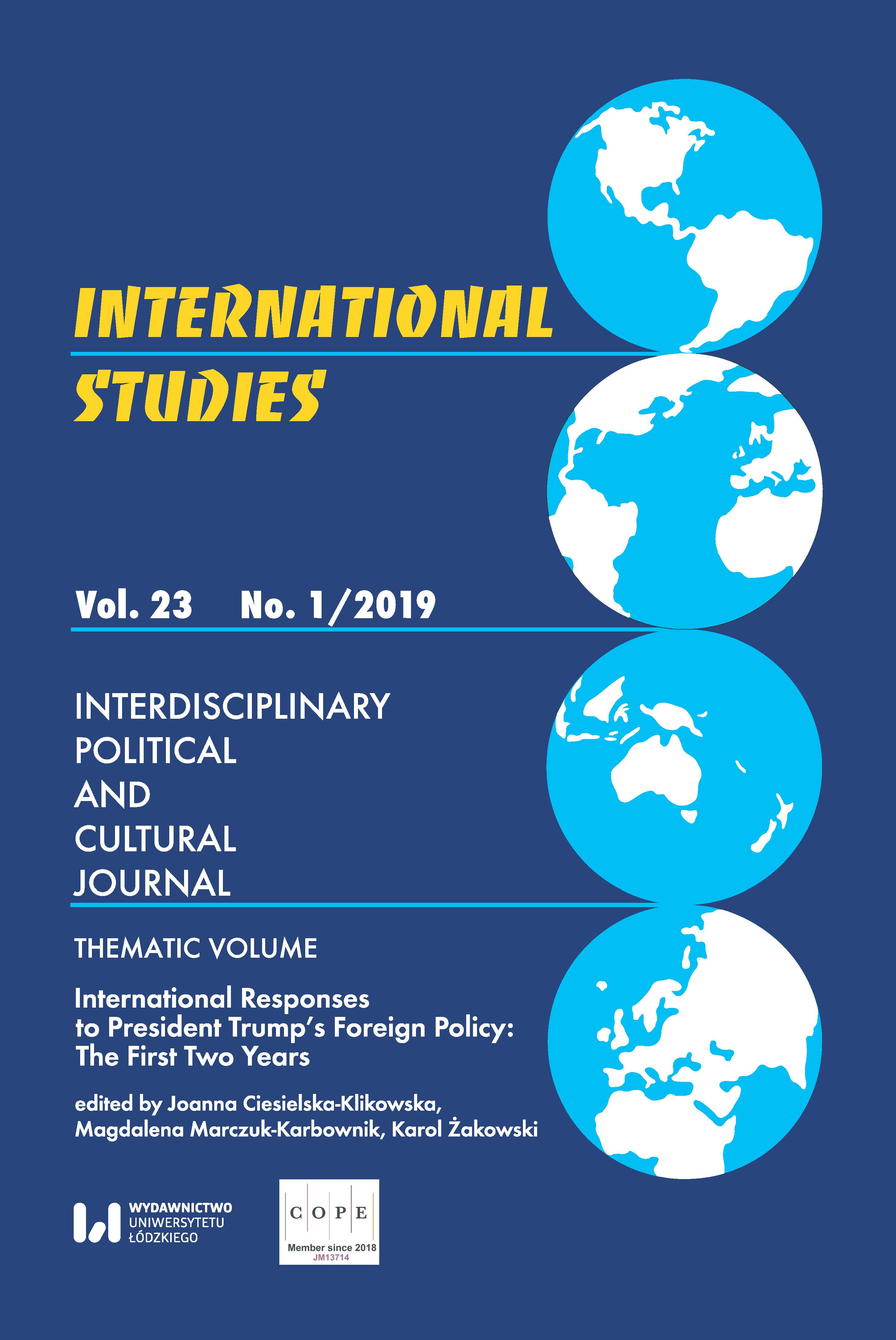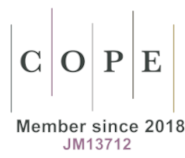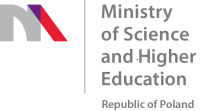Confronting the International Order: Changes in US Foreign Policy from the Perspective of American Power Elites
DOI:
https://doi.org/10.18778/1641-4233.23.02Słowa kluczowe:
United States, international order, Donald Trump, Foreign Affairs, Council on Foreign Relations, US power elite, international relations theories, ideological rivalry, Russia, ChinaAbstrakt
The aim of this article is to present the most important voices on the role of the US in the international order during Donald Trump’s presidency in the debate held in the Foreign Affairs. The authors assume that Foreign Affairs expresses the opinions of the most crucial organisation bringing together the elites of American foreign affairs – the Council on Foreign Relations. The paper proposes a hypothesis according to which there is a difference of opinion due to the adopted theoretical perspective regarding Trump’s role in the destruction of the liberal international order among the American power elites, even though they agree that the ideological conflict between democratic and authoritarian countries around the world is escalating.
Pobrania
Bibliografia
Abelson, D. Theoretical Models and Approaches to Understanding the Role of Lobbies and Think Tanks in US Foreign Policy. Policy Expertise in Contemporary Democracies. Ed. Stephen Brooks, Dorota Stasiak, and Tomasz Zyro. Burlington: Ashgate, 2012.
Zobacz w Google Scholar
Abrams, E. Trump the Traditionalists. A Surprisingly Standard Foreign Policy, “Foreign Affairs”, no. 96.4 (2017), pp. 10–16.
Zobacz w Google Scholar
Allison, G. The Myth of the Liberal Order From Historical Accident to Conventional Wisdom, “Foreign Affairs”, no. 97.4 (2018), pp. 124–133.
Zobacz w Google Scholar
Annual Membership Dues. Council on Foreign Relations. Web. 14 Sep 2018, https://www.cfr.org/sites/default/files/report_pdf/CFRMemberDues-July2017.pdf
Zobacz w Google Scholar
Bacevich, A.J. Saving “America First”. What Responsible Nationalism Looks Like, “Foreign Affairs”, no. 96.5 (2017), pp. 57–67.
Zobacz w Google Scholar
Biden, J.R. Building on Success, Opportunities for the Next Administration. “Foreign Affairs”, no. 95.5 (2016), pp. 46–58.
Zobacz w Google Scholar
Circulation. “Foreign Affairs”. Web. 14 Sep 2018, https://www.foreignaffairs.com/circulation
Zobacz w Google Scholar
Cohen, E.A. The Big Stick: The Limits of Soft Power and the Necessity of Military Force. New York: Basic Books, 2016.
Zobacz w Google Scholar
Cohen, E.A. Trump’s Lucky Year. Why the Chaos Can’t Last. “Foreign Affairs”, no. 97.2 (2018), pp. 2–9.
Zobacz w Google Scholar
Colgan, J.D. and Robert O. Keohane. The Liberal Order Is Rigged. Fix it Now or Watch It Wither. “Foreign Affairs”, no. 96.3 (2017), pp. 36–44.
Zobacz w Google Scholar
Delury, J. Trump and North Korea. Reviving the Art of the Deal. “Foreign Affairs”, no. 96.2 (2017), pp. 46–51.
Zobacz w Google Scholar
Deudney, D. and G.J.I. Liberal World. The Resilient Order. “Foreign Affairs”, no. 97.4 (2018), pp. 16–24.
Zobacz w Google Scholar
Feigenbaum, Evan A. China and the World. “Foreign Affairs”, no. 96.1 (2017), pp. 33–40.
Zobacz w Google Scholar
Foreign Affairs Again Ranked Most Influential of All Media by US Opinion-Leader Study. Council on Foreign Relations. Web. 14 Sep 2018, https://www.cfr.org/news-releases/foreign-affairs-again-ranked-most-influential-all-media-us-opinion-leader-study
Zobacz w Google Scholar
Funding. Council on Foreign Relations. Web. 14 Sep 2018, https://www.cfr.org/who-we-are/funding
Zobacz w Google Scholar
Grose, P. Continuing the Inquiry: The Council on Foreign Relations from 1921 to 1996. New York: Council on Foreign Relations Press, 1996.
Zobacz w Google Scholar
Haass, R.N. A World in Disarray: America Foreign Policy and the Crisis of the Old Order. New York: Penguin Press, 2017b.
Zobacz w Google Scholar
Haass, R.N. Where to Go From Here. Rebooting American Foreign Policy. “Foreign Affairs”, no. 96.4 (2017c), pp. 2–9;
Zobacz w Google Scholar
Haass, R.N. World Order 2.0. “Foreign Affairs”, no. 96.1 (2017a), pp. 2–9.
Zobacz w Google Scholar
History. “Foreign Affairs”. Web. 14 Sep 2018, https://www.foreignaffairs.com/history
Zobacz w Google Scholar
Ikenberry, G.J. The Plot Against American Foreign Policy. Can the Liberal Order Survive. “Foreign Affairs”, no. 96.3 (2017), pp. 2–9.
Zobacz w Google Scholar
Individual Membership. Council on Foreign Relations. Web. 14 Sep 2018, https://www.cfr.org/membership/individual-membership
Zobacz w Google Scholar
James M. Lindsay. Council on Foreign Relations. Web. 14 Sep 2018, https://www.cfr.org/experts/james-m-lindsay
Zobacz w Google Scholar
Kotkin, S. Realist World. The Players Change, but the Game Remains. “Foreign Affairs”, no. 97.4 (2018), pp. 10–15.
Zobacz w Google Scholar
Kroenig, M. The Case for Trump’s Foreign Policy. The Right People, the Right Positions. “Foreign Affairs”, no. 96.3 (2017), pp. 30–34.
Zobacz w Google Scholar
Lieber, R.J. Retreat and Its Consequences: American Foreign Policy and the Problem of World Order. New York: Cambridge University Press, 2016.
Zobacz w Google Scholar
DOI: https://doi.org/10.1017/CBO9781316493939
Lind, J. Asia’s Other Revisionist Power. Why US Grand Strategy Unnerves China. “Foreign Affairs”, no. 96.2 (2017), pp. 74–82.
Zobacz w Google Scholar
List the four journals that publish articles with the greatest influence on the way IR scholars think about international relations. TRIP Faculty Survey All Countries Combined (Sep. 9, 2014). Web. 14 Sep 2018, https://trip.wm.edu/charts/#/bargraph/38/5068
Zobacz w Google Scholar
Mania, A. Europa Środkowa w celach polityki USA w latach I wojny światowej. 14 punktów Wilsona. Państwa europejskie na drodze do niepodległości: (w drugiej połowie XIX i XX wieku): studia ofiarowane Profesorowi Marianowi Zgórniakowi. Ed. Irena Stawowy-Kawka and Wojciech Rojek. Kraków: Historia Iagellonica, 2003.
Zobacz w Google Scholar
Mania, A., and Pugacewicz, T. Wybrane elementy kondycji Stanów Zjednoczonych u progu prezydentury Donalda Trumpa [Selected aspects of the United States’ condition on the threshold of Donald Trump’s presidency]. “Rocznik Strategiczny”, no. 22 (2017), pp. 247–259.
Zobacz w Google Scholar
Mazarr, Michael J. The Once and Future Order. “Foreign Affairs”, no. 96.1 (2017), pp. 25–32.
Zobacz w Google Scholar
Mazarr, Michael J. The Real History of the Liberal Order: Neither Myth Nor Accident. “Foreign Affairs” (Aug. 7, 2018). Web. 14 Sep 2018, https://www.foreignaffairs.com/articles/2018–08–07/real-history-liberal-order
Zobacz w Google Scholar
McGann, J.G. 2017 Global Go To Think Tank Index Report. Philadelphia: University of Pennsylvania, 2018.
Zobacz w Google Scholar
McGann, J.G. Think Tanks and Policy Advice in the US. Philadelphia: Foreign Policy Research Institute, 2005.
Zobacz w Google Scholar
Mead, W.R. The Jacksonian Revolt. American Populism and the Liberal Order. “Foreign Affairs”, no. 96.2 (2017), pp. 2–7.
Zobacz w Google Scholar
Mounk, Y. and Foa, R.S. The End of the Democratic Century. Autocracy’s Global Ascendance. “Foreign Affairs”, no. 97.3 (2018), pp. 29–36.
Zobacz w Google Scholar
Niblett, R. Liberalism in Retreat. “Foreign Affairs”, no. 96.1 (2017), pp. 17–24.
Zobacz w Google Scholar
Nye, J.S. Will the Liberal Order Survive? “Foreign Affairs”, no. 96.1 (2017), pp. 10–16.
Zobacz w Google Scholar
Parmar, I. Think tanks and power in foreign policy: a comparative study of the role and influence of the Council on Foreign Relations and the Royal Institute of International Affairs, 1939–1945. New York: Palgrave Macmillan, 2004.
Zobacz w Google Scholar
DOI: https://doi.org/10.1057/9780230000780
Patrick, S.M. Trump and World Order. The Return of Self-Help. “Foreign Affairs”, no. 96.2 (2017), pp. 52–57.
Zobacz w Google Scholar
Posen, B.R. The Rise of Illiberal Hegemony. Trump’s Surprising Grand Strategy. “Foreign Affairs”, no. 97.2 (2018), pp. 20–27.
Zobacz w Google Scholar
Pugacewicz, T. Teorie polityki zagranicznej. Perspektywa amerykańskiej analizy polityki zagranicznej [Theories of foreign policy: American foreign policy analysis Perspective]. Kraków: Wydawnictwo Uniwersytetu Jagiellońskiego, 2017.
Zobacz w Google Scholar
Richard N. Haass. Council on Foreign Relations. Web. 14 Sep 2018, https://www.cfr.org/experts/richard-n-haass
Zobacz w Google Scholar
Rose, G. Letting Go. “Foreign Affairs”, no. 97.2 (2018), p. C9.
Zobacz w Google Scholar
DOI: https://doi.org/10.2307/j.ctvc7734v.9
Rose, G. Out of Order. “Foreign Affairs”, no. 96.1 (2017), p. C9.
Zobacz w Google Scholar
Rumer, E.B. Richard Sokolsky, and Andrew S. Weiss. Trump and Russia. The Right Way to Manage Relations. “Foreign Affairs”, no. 96.2 (2017), pp. 12–19.
Zobacz w Google Scholar
Schake, K. Will Washington Abandon the Order? “Foreign Affairs”, no. 96.1 (2017), pp. 41–46.
Zobacz w Google Scholar
Schulzinger, R.D. The Wise Men of Foreign Affairs: The History of the Council on Foreign Relations. New York: Columbia University Press, 1984.
Zobacz w Google Scholar
DOI: https://doi.org/10.7312/schu94342
Shirk, S. Trump and China. Getting to Yes With Beijing. “Foreign Affairs”, no. 96.2 (2017), pp. 20–27.
Zobacz w Google Scholar
Shoup, L.H. Wall Street’s think tank: the Council on Foreign Relations and the empire of neoliberal geopolitics, 1976–2014. New York: Monthly Review Press, 2015.
Zobacz w Google Scholar
Shoup, L.H. and William Minter. Imperial brain trust: the Council on Foreign Relations and United States foreign policy. New York: Monthly Review Press, 1977.
Zobacz w Google Scholar
Staff. “Foreign Affairs”. Web. 14 Sep 2018, https://www.foreignaffairs.com/staff#PUB
Zobacz w Google Scholar
Submissions. “Foreign Affairs”. Web. 14 Sep 2018, https://www.foreignaffairs.com/submissions-0
Zobacz w Google Scholar
Sullivan, J. The World After Trump. How the System Can Endure. “Foreign Affairs”, no. 97.2 (2018), pp. 10–19.
Zobacz w Google Scholar
The Council on Foreign Relations: A Record of Twenty-five Years, 1921–1946. New York: Council on Foreign Relations, 1947.
Zobacz w Google Scholar
Think Tank. Council on Foreign Relations. Web. 14 Sep 2018, https://www.cfr.org/think-tank
Zobacz w Google Scholar
Think Tanks. New York Times (Aug. 10, 2008). Web. 14 Sep 2018, https://ideas.blogs.nytimes.com/2008/08/10/think-tanks/
Zobacz w Google Scholar
Trimbath, S. Think Tanks: Who’s Hot. “The International Economy: the Magazine of International Economic Policy” (2005), pp. 10–15, 39–47.
Zobacz w Google Scholar
Wala, M. Council on Foreign Relations and American foreign policy in the early Cold War. Providence: Berghahn Books, 1994.
Zobacz w Google Scholar
Wala, M. Winning the peace: amerikanische Außenpolitik und der Council on Foreign Relations, 1945–1950. Stuttgart: F. Steiner, 1990.
Zobacz w Google Scholar
Pobrania
Opublikowane
Jak cytować
Numer
Dział
Licencja

Utwór dostępny jest na licencji Creative Commons Uznanie autorstwa – Użycie niekomercyjne – Bez utworów zależnych 4.0 Międzynarodowe.

















